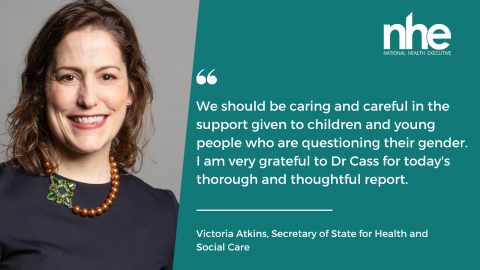The NHS should engage in more research, enable more treatment pathways, and exercise extreme caution when providing hormone treatment, according to recommendations made as part of Dr Hilary Cass’ independent review on gender identify services for children and young people.
The report was originally commissioned by NHS England to investigate how to improve NHS gender identity services and better understand the recent increase in referrals.
Key findings
The report says there is no simple explanation as to why referrals have increased, but it is likely due to be a combination of biological, psychological and social factors.
While there has been a considerable amount of research, the quality is poor according to the review, meaning there is no reliable evidence base to benchmark clinical decisions or for patients to make treatment choices.
The conversations on medical treatments have courted so much controversy that it has taken away from the original purpose of care and treatment. There is also weak evidence regarding the impact of puberty suppression on gender dysphoria and mental health.
For those under the age of 18, masculinising or feminising hormones still present many unknowns despite their use in the adult transgender community – the lack of follow-up data also means there is not enough information on outcomes.
It is not enough to just provide medical treatment to those with gender-related distress; the wider mental health or psychosocial challenges must also be addressed.
Leaders must ensure regulation does not stifle progress but also protects against unproven approaches.

Recommendations
Capacity should be expanded via a distributed service model, which would be based in paediatric services and strengthen links to secondary care.
Those referred to gender services should receive holistic care and be treated to the same standard as other services that deal with children and young people.
A separate pathway for pre-pubertal children should be established to make sure they are seen as early as possible, while regional NHS centres should all have a follow-through service for 17-25-year-olds. This will also improve data collection.
Leaders should understand that, for those who wish to detransition, they may not wish to reengage with previously accessed services.
Research should be conducted to gain better insight into the characteristics, interventions and outcomes of all the young people presenting to gender services – the puberty blocker trial should form part of a research portfolio looking at psychosocial interventions and masculinising and feminising hormones.
Although the option to provide said hormones to 16-year-olds is available, clinicians should take extreme caution and ensure there is a clear rationale for doing so at 16 rather than waiting until the patient turns 18.
Industry reaction
In response to the publication, an NHS spokesperson highlighted the work already being done to transform gender services for children and young people, including moving to a regional delivery model and the routine use of puberty suppressing hormones being stopped.
The spokesperson said: “We will set out a full implementation plan following careful consideration of this final report and its recommendations, and the NHS is also bringing forward its systemic review of adult gender services”.
The LGBTQ+ charity, Stonewall, has released a statement saying that while some of the recommendations could have positive impacts, “without due care, training or further capacity in the system, others could lead to new barriers that prevent children and young people from accessing the care they need”.
The secretary of state for health and social care, Victoria Atkins, has added that she will be working with NHS England and relevant regulators to implement further service improvements as soon as possible.
“The first step for the NHS is to expand capacity, offer wider interventions, upskill the broader workforce, take an individualised, personal approach to care, and put in place the mechanisms to collect the data needed for quality improvement and research,” said Dr Hilary Cass.
She added: “I have recommended a service model that has inbuilt mechanisms to be able to evolve and adapt with the emerging research overseen by appropriate governance structures both within individual NHS organisations and at a national level.”
Image credit: iStock



















